#Thomas Kaufmann
Text
HoS: Thomas Kaufmann liest aus "Die Druckmacher" – Uwe Kullnick spricht mit dem Autor
HoS: Thomas Kaufmann liest aus “Die Druckmacher” – Uwe Kullnick spricht mit dem Autor
[vc_row][vc_column][vc_column_text]
HoS: Thomas Kaufmann liest aus “Die Druckmacher” – Uwe Kullnick spricht mit dem Autor
Wie die Generation Luther die erste Medienrevolution entfesselte
Lesung Thomas Kaufmann (Hördauer ca. 13 min)
https://literaturradiohoerbahn.com/wp-content/uploads/2022/11/HoS_T.-Kaufmann-Lesung-upload.mp3
Gespräch zwischen Thomas Kaufmann und Uwe Kullnick (Hördauer ca. 62…

View On WordPress
#Die Druckmacher#digital immigrants#digital natives#erste Medienrevolution#Hörbahn on Stage#Thomas Kaufmann#Tod#Uwe Kullnick
0 notes
Text
























⠀⠀ ⠀⠀ ⠀⠀ ⠀✶. ⩩ random 𝗺𝗲𝗻 icons 〻
#boys icons#orange icons#red icons#simple icons#icons#social spirit#spirit icons#spirit fanfics#spirit#120×120 icons#120x120#oliver muhl#pietro checchi#jacob rott#juani zalazar#nic kaufmann#thomas kuc#kahlil beth#abel carden#neil josten#all for the game#aftg
36 notes
·
View notes
Text
youtube
TODAY IN PHILOSOPHY OF HISTORY
Hegel on the Journey of Spirit to Self-Understanding
Tuesday 27 August 2024 is the 254th anniversary of the birth of Georg Wilhelm Friedrich Hegel (27 August 1770 – 14 November 1831), who was born in Stuttgart on this date in 1770.
It is unlikely that anyone would call Hegel’s philosophy of history an Enlightenment philosophy of history, but there is a sense in which Hegel is the culmination of an especially fertile period in the philosophy of history that preceded him. Hegel transcended these Enlightenment philosophies of history in a supremely abstract way of understanding history and the developments it unfolds.
Quora: https://philosophyofhistory.quora.com/
Discord: https://discord.gg/r3dudQvGxD
Links: https://jnnielsen.carrd.co/
Newsletter: http://eepurl.com/dMh0_-/
Text post: https://geopolicraticus.substack.com/p/hegel-on-the-journey-of-spirit-to
Video: https://youtu.be/kPIcS2x51tE
Podcast: https://spotifyanchor-web.app.link/e/hEhcN4j0pMb
#philosophy of history#youtube#G. W. F. Hegel#Hegel#Walter Kaufmann#William Barrett#Bertrand Russell#Sidney Hook#Thomas Carlyle#Napoleon#Dasein#spirit#hero#Youtube
2 notes
·
View notes
Text
28 marzo … ricordiamo …
28 marzo … ricordiamo …
#semprevivineiricordi #nomidaricordare #personaggiimportanti #perfettamentechic
2023: Ryūichi Sakamoto è stato un musicista, compositore e attore giapponese. Viene considerato tra i pionieri della fusione tra la musica etnica orientale e le sonorità elettroniche occidentali. Dapprima membro degli Yellow Magic Orchestra, gruppo musicale seminale per la musica elettronica giapponese e il j-pop, Sakamoto inaugurò successivamente la carriera solista e divenne compositore di note…

View On WordPress
#Adeline Virginia Stephen#Adeline Virginia Woolf#Alexander Kiam#Charlotte Burton#Christine Kaufmann#David Michael Schramm#David Schramm#Dick Haymes#Ellen Evangeline Hovick#Enrico Vaime#Herry Potter#John Callahan#John Kevin Callahan#June Havoc#Lily Savage#Madeleine Ozeray#Madeleine Suzanne Marie Claire Vuillerme#Magdeleine Marie Catherine Élisabeth Ozeray#Omar Kiam#Paul James O&039;Grady#Paul O&039;Grady#Personaggi importanti#Richard Arlen#Richard Benjamin Haymes#Richard Griffiths#Richard Thomas Griffiths#Ricordare#Ricordi#Ricordiamo#Ryūichi Sakamoto
2 notes
·
View notes
Text

And here once more we have Jonas on the floor, this time with his Rodrigo. Truly, a picture of a man in his element.
#jonas kaufmann#jonas x floor#carlo x rodrigo#thomas hampson#don carlo#verdi#salzburg festival#opera
9 notes
·
View notes
Text
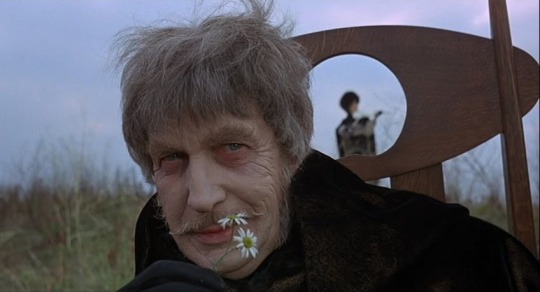
The Abominable Dr. Phibes (1971)
In the late 1950s and 1960s, American International Pictures (AIP) was a minor Hollywood studio with an outsized reputation. AIP, which made nothing but low-budget pictures and B-movies during its existence, focused on cornering the market for teenagers and young adults. Rather than making an endless string of superhero movies, AIP instead relied on its Beach Party series and related films (1963-1967) and inexpensive horror movies (usually involving producer/director Roger Corman). One of AIP’s mainstays for its coterie of horror films was none other than Vincent Price. A longtime character actor for 20th Century Fox, Price had only begun to regularly feature in horror films beginning with House of Wax (1953). From there, he became a regular on AIP’s Edgar Allan Poe adaptations (very loose adaptations, mind you) under Corman’s direction. No matter how dastardly Price’s characters schemes were in his numerous horror films, Price’s almost effortless charm always pored through, to the point that one cannot help but root for his schemes to succeed.
Though Roger Corman was not involved in The Abominable Dr. Phibes (Phibes rhymes with “bribes”), a portion of Price’s fans point to his performance here in the title role as the Vincent Price-iest of all. In this darkly comedic horror film directed by former production designer Robert Fuest (the 1961-1969 TV series The Avengers, director on 1970’s Wuthering Heights), the film’s deliberate campiness demands more absurd motivations, plot developments, and aesthetic choices than some viewers might be comfortable with. In short, this is not the ideal introduction to Vincent Price or AIP’s horror movies. To enjoy the first Phibes film is to be in on the joke, to accept the film’s inherent silliness.
The opening credits help set that mood. As they roll, Dr. Phibes (Price) ascends from beneath a flight of stairs, playing on organ Felix Mendelssohn’s “War March of the Priests” from Athalie. His only company in this fiendish lair are his tall, silent assistant Vulnavia (Virginia North) and his animatronic band, the Dr. Phibes Clockwork Wizards. Reported killed in a Switzerland car accident in 1921 alongside his wife Victoria, Phibes (who carries heavy facial scars and lost his speaking voice in the crash) is hellbent on seeking revenge against the British doctors who presided over Victoria’s failed surgery. Instead of going to therapy, Phibes murders the doctors instead. One after another, the doctors die in increasingly elaborate ways – each homicide inspired by one of the ten Plagues of Egypt as described in the Book of Exodus. After the third doctor dies, Scotland Yard finally begins connecting the dots under Inspector Harry Trout (Peter Jeffrey). Trout soon realizes that the deceased were all directed by Dr. Vesalius (Joseph Cotten). This revelation only begins to unearth Phibes’ wicked plot.
Elsewhere, Hugh Griffith plays a helpful Rabbi and Terry-Thomas plays one of the doctors. Derek Godfrey and John Cater play Inspector Trout’s superiors, Crow and Weaverly, respectively. Aubrey Woods, whom most know as Bill the Candy Man from Willy Wonka and the Chocolate Factory (1971), plays an eyewitness named Goldsmith.
youtube
The screenplay by William Goldstein (who returned for the sequel), James Whiton (his only major writing credit), and Fuest, is no one’s idea of sensible, intelligently structured writing. The transitions between the scenes involving Phibes, his assistant, and the victims to Scotland Yard and Dr. Vesalius are untidy. Goldstein, Whiton, and Fuest attempt to make more of a mystery out of this film than they should, but it only serves to make the investigatory half of the film as a dumping ground of expository dialogue. The scenes with Phibes are the zanier, far more interesting parts of the screenplay – even though the character can no longer speaker (the writers engineer an inexplicable workaround, but this unlikely development can have a pass in the context of this bizarre work). For the scriptural scholars among us, some of the stylish killings of the unsuspecting doctors take liberties with the stated Ten Plagues of Egypt. Though perhaps unacceptable to those demanding strict adherence to the holy texts, the thematic divergences of those murders are still so cockamamie that most viewers probably do not mind.
Dr. Phibes’ murders would make Jigsaw from the Saw series (2004-present) proud. To be clear, The Abominable Dr. Phibes is not a slasher film (a subgenre that was beginning to find its foundations by the early 1970s), but it contains elements that would become slasher hallmarks – an individual committing several revenge killings due to a past event, a sort of catharsis (in later slasher movies, sexual gratification) in the act of killing, and unusual manners of murder. Instead of horrifying the viewer with the wanton death, it is Vincent Price’s performance that keeps The Abominable Dr. Phibes within the confines of comedic horror. Due to reasons that I do not wish to spoil, Price’s Phibes scarcely makes a facial expression aside from his default, neutral gaze. His gait is deliberate and steady. Without the possibility of any facial muscular contortions or Price’s trademark smirk, so much of Price’s performance is through his eyes. From his thousand-yard stares, contemptuous gazes, world weary looks, and bemused glances, Price provides an enormous amount of the film’s soul and tenor with so little of his body. This sounds like a silent film director’s dream, but Price’s performance is a commanding one, in any era. His Dr. Phibes may not be in full control of his movements (thanks to Trevor Crole-Rees’ excellent makeup design), but Price is always fully in control of his acting. No surprise to anyone who knows Price’s work – always dependable to provide his utmost effort, no matter how dire the material.
The screenplay, nevertheless, keeps some emotional distance between the audiences and the title character. Though the film’s absurdity allows the viewer to scrap their sense of morality while watching Phibes slaughter each of the doctors, Phibes’ psychology is inaccessible until the film’s second half. The filmmakers, by not prioritizing Phibes’ mindset as much as they could, continually frame him as the villain amid bumbling detectives, the privileged victims (ensuring that the viewer cares not too much about their deaths), and the prideful Dr. Vesalius (whose hubris erodes as the film progresses, revealing his desperate humanity).
If anybody could be considered a co-lead here, that would be Joseph Cotten as Dr. Vesalius. The underrated and undermentioned Cotten, not at all known for his horror work and more for his collaborations with Orson Welles (namely 1941’s Citizen Kane and 1942’s The Magnificent Ambersons), performs ably here. Cotten replaced Price’s friend, Peter Cushing (Grand Moff Tarkin in 1977’s Star Wars, a regular as Baron Frankenstein and Van Helsing in Hammer horror movies), after Cushing fell ill. Cushing would have been ideal in the role, but never does Cotten act as if the unconvincing dialogue is beneath him, even if he doesn’t attempt to hide his American accent. As Dr. Vesalius, Cotten wonderfully inhabits his character’s desperation as his colleagues meet their ends, as if prophesied.
Set designer Brian Eatwell (1973’s The Three Musketeers, 1976’s The Man Who Fell to Earth) runs rampant with his design to Phibes’ lair. A curious combination of art deco and the garishness of 1970s colors serves the film’s ludicrousness. I am not sure how livable Phibes’ abode is – there are nary any bedrooms or any other amenities depicted – but the central chamber could be an ideal place for a raucous, demented soiree. Vulnavia’s ever-changing wardrobe in each of her scenes is also a delight, thanks to costume designer Elsa Fennell (1964’s Goldfinger, 1971’s Diamonds Are Forever). Perhaps there isn’t too much of association between campy costumes and sets with heartrending motives for murder, but that is exactly what transpires in The Abominable Dr. Phibes.
In addition, a laughably anachronistic soundtrack of swing jazz and Great American Songbook standards dot the film. I was not prepared for the appearance of either Mendelssohn’s “War March of the Priests” nor the legendary song that rounds out the closing credits. Phibes’ introduction while playing the former on organ readies the viewer not to take everything that is about to unfold seriously. For the latter song (again, I dare not spoil this), a brilliant solo trumpet takes the easily recognizable melody and swings it. Lyrically, this song’s placement in the end credits is fitting for what happens to Phibes. But I could not help but laugh the moment I heard the opening notes – a fitting send-off to a gleefully daft movie.
When The Abominable Dr. Phibes arrived in theaters, its poster showed the mutilated Dr. Phibes appearing as if he is about to kiss a woman. Above them read the tagline: “Love means never having to say you’re ugly.” This was a reference to Love Story (1970), with its (in)famous tagline and in-movie quote: “Love means never having to say you’re sorry.” The marketing for The Abominable Dr. Phibes confused audiences – was it a romance? horror? parody? – and the film struggled initially before AIP retooled its advertising to market the film as a horror film. On its low budget, the film was successful enough to warrant AIP to greenlight a sequel, Dr. Phibes Rises Again (1972). That sequel marked the beginning of the end of Price’s association with AIP, due to conflicts over his pay (while AIP’s box office fortunes were dwindling), his lack of satisfaction with the scripts coming his way (not even Price wanted to star in two Dr. Goldfoot movies in two years), and AIP’s plans to replace him with Robert Quarry as their primary horror star.
In the years since the film’s debut in cinemas, The Abominable Dr. Phibes has garnered a deserved cult status. There was no stopping Vincent Price from leaving AIP, but AIP – with their Robert Quarry plans not even a secret – somehow undervalued the actor who was their principal attraction through the 1960s. An essential in Price’s filmography, The Abominable Dr. Phibes defies genre conventions, genre categorization, and any semblance of rationality. For those looking for some bloody horror as the mercury drops, look no further than here. The first Dr. Phibes films guarantees murders with a wink and, though not a smile, an animatronic band playing hits that have yet to be composed.
My rating: 7/10
^ Based on my personal imdb rating. My interpretation of that ratings system can be found in the “Ratings system” page on my blog. Half-points are always rounded down.
For more of my reviews tagged “My Movie Odyssey”, check out the tag of the same name on my blog.
#The Abominable Dr. Phibes#Robert Fuest#Vincent Price#Joseph Cotten#Peter Jeffrey#Virginia North#Hugh Griffith#Terry Thomas#Derek Godfrey#John Cater#Aubrey Woods#William Goldstein#James Whiton#Sean Bury#John Laurie#Trevor Crole-Rees#Maurice Kaufmann#TCM#My Movie Odyssey
3 notes
·
View notes
Text
Erneuter 10 KM-Vereinsrekord durch Benjamin Kaufmann
Benjamin Kaufmann hat den Brunnenlauf des SV Sonsbeck für einen neuen Vereinsrekord über 10 Kilometer genutzt. Der 20-Jährige ließ sich auf den vier 2,5 Kilometer langen Runden von zahlreichen Assen ziehen und war schließlich nach 34:29 min als 16. im Ziel (7. MHK).
Benjamin (430) zusammen mit Jan Heinemann (111) und Benedikt Vieten (411). Hinten zu sehen Süleyman Kuzguncu (1336), der beim…

View On WordPress
0 notes
Text
A Tribute to My Mentors & Heroes
They Fought the Fight of Faith and Finished the Race
Dr. Thomas Graham above; Dave with Dr. Richard Kaufmann
Two great men, who were heroes in the faith, spiritual fathers and amazingly wonderful mentors moved to heaven in February. Dr. Thomas Graham graduated to glory on February 17th. Dr. Richard Kaufmann left this earth on the next day February 18th.
The Lord has blessed me on my journey as…

View On WordPress
#donate#Dr. Richard Kaufmann#Dr. Thomas Graham#Dr. William Iverson#Encouragement#grieving#Jay Kyle#mentors#Mourning
0 notes
Text
Opera on YouTube, Part 2
Le Nozze di Figaro (The Marriage of Figaro)
Glyndebourne Festival Opera, 1973 (Knut Skram, Ileana Cotrubas, Kiri Te Kanawa, Benjamin Luxon; conducted by John Pritchard; English subtitles)
Jean-Pierre Ponnelle studio film, 1976 (Hermann Prey, Mirella Freni, Kiri Te Kanawa, Dietrich Fischer-Dieskau; conducted by Karl Böhm; English subtitles) – Acts I and II, Acts III and IV
Tokyo National Theatre, 1980 (Hermann Prey, Lucia Popp, Gundula Janowitz, Bernd Weikl; conducted by Karl Böhm; Japanese subtitles)
Théâtre du Châtelet, 1993 (Bryn Terfel, Alison Hagley, Hillevi Martinpelto, Rodney Gilfry; conducted by John Eliot Gardiner; Italian subtitles)
Glyndebourne Festival Opera, 1994 (Gerald Finley, Alison Hagley, Renée Fleming, Andreas Schmidt; conducted by Bernard Haitink; English subtitles)
Zürich Opera House, 1996 (Carlos Chaussón, Isabel Rey, Eva Mei, Rodney Gilfry; conducted by Nikolaus Harnoncourt; English subtitles)
Berlin State Opera, 2005 (Lauri Vasar, Anna Prohaska, Dorothea Röschmann, Ildebrando d'Arcangelo; conducted by Gustavo Dudamel; French subtitles)
Salzburg Festival, 2006 (Ildebrando d'Arcangelo, Anna Netrebko, Dorothea Röschmann, Bo Skovhus; conducted by Nikolas Harnoncourt; English subtitles) – Acts I and II, Acts III and IV
Teatro all Scala, 2006 (Ildebrando d'Arcangelo, Diana Damrau, Marcella Orasatti Talamanca, Pietro Spagnoli; conducted by Gérard Korsten; English and Italian subtitles)
Salzburg Festival, 2015 (Adam Plachetka, Martina Janková, Anett Fritsch, Luca Pisaroni; conducted by Dan Ettinger; no subtitles)
Tosca
Carmine Gallone studio film, 1956 (Franca Duval dubbed by Maria Caniglia, Franco Corelli, Afro Poli dubbed by Giangiacomo Guelfi; conducted by Oliviero de Fabritiis; no subtitles)
Gianfranco de Bosio film, 1976 (Raina Kabaivanska, Plácido Domingo, Sherrill Milnes; conducted by Bruno Bartoletti; English subtitles)
Metropolitan Opera, 1978 (Shirley Verrett, Luciano Pavarotti, Cornell MacNeil; conducted by James Conlon; no subtitles)
Arena di Verona, 1984 (Eva Marton, Jaume Aragall, Ingvar Wixell; conducted by Daniel Oren; no subtitles)
Teatro Real de Madrid, 2004 (Daniela Dessí, Fabio Armiliato, Ruggero Raimondi; conducted by Maurizio Benini; English subtitles)
Royal Opera House, Covent Garden, 2011 (Angela Gheorghiu, Jonas Kaufmann, Bryn Terfel; conducted by Antonio Pappano; English subtitles)
Finnish National Opera, 2018 (Ausrinė Stundytė, Andrea Carè, Tuomas Pursio; conducted by Patrick Fournillier; English subtitles)
Teatro alla Scala 2019 (Anna Netrebko, Francesco Meli, Luca Salsi; conducted by Riccardo Chailly; Hungarian subtitles)
Vienna State Opera, 2019 (Sondra Radvanovsky, Piotr Beczala, Thomas Hampson; conducted by Marco Armiliato; English subtitles)
Ópera de las Palmas, 2024 (Erika Grimaldi, Piotr Beczala, George Gagnidze; conducted by Ramón Tebar; no subtitles)
Don Giovanni
Salzburg Festival, 1954 (Cesare Siepi, Otto Edelmann, Elisabeth Grümmer, Lisa della Casa; conducted by Wilhelm Furtwängler; English subtitles)
Giacomo Vaccari studio film, 1960 (Mario Petri, Sesto Bruscantini, Teresa Stich-Randall, Leyla Gencer; conducted by Francesco Molinari-Pradelli; no subtitles)
Salzburg Festival, 1987 (Samuel Ramey, Ferruccio Furlanetto, Anna Tomowa-Sintow, Julia Varady; conducted by Herbert von Karajan; no subtitles)
Teatro alla Scala, 1987 (Thomas Allen, Claudio Desderi, Edita Gruberova, Ann Murray; conducted by Riccardo Muti; English subtitles)
Peter Sellars studio film, 1990 (Eugene Perry, Herbert Perry, Dominique Labelle, Lorraine Hunt Lieberson; conducted by Craig Smith; English subtitles)
Teatro Comunale di Ferrara, 1997 (Simon Keenlyside, Bryn Terfel, Carmela Remigio, Anna Caterina Antonacci; conducted by Claudio Abbado; no subtitles) – Act I, Act II
Zürich Opera, 2000 (Rodney Gilfry, László Polgár, Isabel Rey, Cecilia Bartoli; conducted by Nikolaus Harnoncourt; English subtitles)
Festival Aix-en-Provence, 2002 (Peter Mattei, Gilles Cachemaille, Alexandra Deshorties, Mirielle Delunsch; conducted by Daniel Harding; no subtitles)
Teatro Real de Madrid, 2006 (Carlos Álvarez, Lorenzo Regazzo, Maria Bayo, Sonia Ganassi; conducted by Victor Pablo Pérez; English subtitles)
Festival Aix-en-Provence, 2017 (Philippe Sly, Nahuel de Pierro, Eleonora Burratto, Isabel Leonard; conducted by Jérémie Rohrer; English subtitles)
Madama Butterfly
Mario Lanfranchi studio film, 1956 (Anna Moffo, Renato Cioni; conducted by Oliviero de Fabritiis; no subtitles)
Jean-Pierre Ponnelle studio film, 1974 (Mirella Freni, Plácido Domingo; conducted by Herbert von Karajan; English subtitles)
New York City Opera, 1982 (Judith Haddon, Jerry Hadley; conducted by Christopher Keene; English subtitles)
Frédéric Mitterand film, 1995 (Ying Huang, Richard Troxell; conducted by James Conlon; English subtitles)
Arena di Verona, 2004 (Fiorenza Cedolins, Marcello Giordani; conducted by Daniel Oren; Spanish subtitles)
Sferisterio Opera Festival, 2009 (Raffaela Angeletti, Massimiliano Pisapia; conducted by Daniele Callegari; no subtitles)
Vienna State Opera, 2017 (Maria José Siri, Murat Karahan; conducted by Jonathan Darlington; no subtitles)
Wichita Grand Opera, 2017 (Yunnie Park, Kirk Dougherty; conducted by Martin Mazik; English subtitles)
Teatro San Carlo, 2019 (Evgenia Muraveva, Saimir Pirgu; conducted by Gabriele Ferro; no subtitles)
Rennes Opera House, 2022 (Karah Son, Angelo Villari; conducted by Rudolf Piehlmayer; French subtitles)
#opera#complete performances#youtube#le nozze di figaro#the marriage of figaro#tosca#don giovanni#madama butterfly#madame butterfly#wolfgang amadeus mozart#giacomo puccini
61 notes
·
View notes
Note
Hi there! I have a request that might be tricky so feel free to ignore this ask. So I'm extremely fascinated by these certain types of vintage Christine's wedding dress bodices that were used in 1990s atleast in Hamburg and Japan and more recently in Brazil. The bodice was made of "stripy" fabric and the basque/belt was quite wide. I wondered could you make a photoset of those bodices? Thank you!
YES! These bodices are absolutely masterpieces. They are so dramatic, so hourglass shaped, so period looking. So... Bjørnson. I love them to pieces and pretty much screamed of joy when they decided to use them for the principals in the Sao Paulo revival.
Their origin is in very early West End days, as well as the first European productions in Stockholm, Vienna, Scheveningen, Hamburg, Basel etc. As the Japanese production replicated West End at the time, they could also be seen there, and is more or less made in that style today. Here's some:
Ryoko Nomura, Tokyo 1988:

Anna Maria Kaufmann, Hamburg c. 1990:

Elisabeth Berg, Stockholm c. 1990:

Jill Washington, West End c. 1994:

Kyoko Suzuki, Tokyo c. 1992:

Eriko Murata (?), Hiroshima 1992:

Ute Baum, Basel 1995:

Colby Thomas, Hamburg 1998 (which is a bit different in fabric and in basque than the others, but the latest incarnation of the style in Germany before they started doing the current look):

Emma Frost, Copenhagen 2009:

Giulia Nadruz, Sao Paulo 2019:

Raquel Paulin, Sao Paulo 2019:

A detail shot of an old German or Dutch bodices used in Brazil:

And a detail shot of an old Swedish bodice used in Denmark:

Aaaaaaaah, bliss!!!!!!
#wedding dress#wedding gown#phantom of the opera#costume making#costume nerding#maria bjørnson#christine daae#kritzy kritzy
42 notes
·
View notes
Note
So, um.. I'd like to request something if that's okay. I've seen your writing for s6 characters and I love them. I wanted to ask do you have any headcanons about s6 islanders' last names?
HELLOOOOOO!
This is such a lovely ask, thank you! There are a few I've seen floating around, but I would love to hear from others as well because I definitely don't have a complete list.
But here are some suggestions! (I've marked the ones in bold that I have used in the past or plan to use if it ever comes up.)
Bella
Bella Sandhu (longbobmckenzie)
Bella Rai (queen_of_boops)
Grace
Grace Thomas
Grace Bonneville
Ivy
Ivy Harris
Chloe
Chloe Kaufmann
Chloe Brunner
Chloe Graf
Flo
Florence Carter
Florence Taylor
Andy
Andrew Kim
Andy Cho
Elliot
Elliot Kjellberg (Like pewdiepie because I find it really funny)
Elliot Windham (rebelrayne)
Francis
Francis Nowak (lucas-koh)
Hamish
Hamish Lennox-Ross (rebelrayne)
Full name Hamish Albert Mountbatten Bertrand Reginald Gregory Lennox-Ross (his initials would be HAMBRGLR)
Jamal
Jamal Jordan and his family call him JJ (sparxaf)
Jamal Lavigne (caitkaminski)
Jamal Farah
Lewie
Llewellyn John Rees
Lewie Pritchard (This is my standard one for him but I realised too late that Bridget Pritchard sounded a bit odd if him and Brig from Unhealthy ever got married so I changed it to Rees for that fic)
Lewie Huey Kablooey (Only mean nasty awful rude people who hate me use this)
Marshall & Ozzy
Marshall Ayan Singh
Ozzy Praveen Singh (queen_of_boops)
Marshall & Ozzy Patel
Roberto
Roberto Ferreira
Roberto Bonifacío Sousa Almeida Ferreira
Roberto Lisbon Portugal FlyBoy McHotTub
Ryan
Ryan Collins
Ryan Mattison
Ryan Grey
Ryan Butt (thanks caitkaminski and rebelrayne)
Toby
Toby Travolta
Toby Dean
20 notes
·
View notes
Note
Tom Blyth as Thomas Kaufmann has me weaaaaakkkkkk 😫 I need this fictional man to do unspeakable things to me
you’re so real for this, bonnie, speak your truth 🫶🏻
#asks#their blonde curls + green eyes + trench coat combo is gonna be the death of me 💀#what lovely bones#ro: t kaufmann#ro edit#also J edit coming soon while i wait for my new keyboard to arrive so i can finally finish chapter 2#bonnie nonnie
54 notes
·
View notes
Note
Youve probably been asked this; but do you have any favorite books, movies, media, etc. on the tudor period or Elizabeth 1?
Also I love your account!!!
You have unlocked an unskippable cutscene
Books:
Fiction:
Elizabeth:
Elizabeth and the Prince of Spain
Legacy (Susan Kay)
The Tudors:
The Man on a Donkey (kind of. It DOES live in my brain rent free.)
The Concubine (Christopher Rae)
On ao3 Hollow Bones and Draw Your Swords
Non-fiction:
How To Be A Tudor
How To Behave Badly In Renaissance Britain both by Ruth Goodman
Tudor England
Henry VIII both by Lucy Wooding
Tudor Children by Nicholas Orme
New Worlds Lost Worlds by Susan Brigden
Black Tudors by Miranda Kaufmann
All Things Made New by Diarmaid Macculloch (make that anything by Macculloch)
The Age of Reformation by Alec Ryrie
The Time Traveller's Guide to Elizabethan England by Ian Mortimer- good, but read this one in conjunction with other historians like Kaufmann.
Thomas More by Joanne Paul. This one's more academic than the others. But it's very good for looking at Tudor politics and philosophy.
Movies:
Elizabeth (1998). Not accurate but more rewatchable than most Tudor dramas.
Lady Jane (1986). Inaccurate but moving.
Anonymous (2011). It's an AU. Not realistic in the slightest. But it moves me, and Elizabeth is such a force of nature that I end up loving her. She's closer to a Greek goddess than the real Elizabeth. Part Athena, part Aphrodite. She's tempestuous, impulsive, but never pathetic. She does whatever she damn well pleases and I find that compelling.
Bill (2015). It's fun.
Luther (1974). Not about the Tudors but one of their most important contemporaries.
TV:
Blackadder II. Not as good as the later series but still fun.
Elizabeth R. Essential viewing.
The Six Wives of Henry VIII. The most accurate Henry VIII. And refreshing in its interpretation of Jane Seymour and Anne of Cleves.
The Shadow of the Tower. I haven't seen all of it. But episode 5 is pretty stand-alone and probably my favourite single piece of Tudor media. You can watch it here. Episode 7 is also a good standalone episode if u want an hour of wacky Tudor hijinks here
Episode 8 if you want early tudor explorers here
Not strictly Tudor, but Jane Howell's Shakespeare tetralogy (Henry VI 1-3, Richard III) is one of my favourite pieces of media... ever.
I'm also fond of the documentaries Hidden Killers of the Tudor Home and A Tudor Feast.
15 notes
·
View notes
Text
You Tube https://www.youtube.com/watch?v=PzLtaF6dYMI&t=101s
14th March 2024
DIE ERMITTLUNG - Plakat und Trailer
Regisseur RP Kahl hat das Theaterstück "Die Ermittlung" von Peter Weiss mit 60 Schauspieler:innen für die Kinoleinwand inszeniert. Der heute veröffentlichte Trailer gibt einen ersten Einblick in das künstlerisch radikale Projekt, das Kino, Theater und neueste Broadcast-Techniken verbindet, um einen eindringlichen und zeitgemäßen Beitrag zur Erinnerungskultur zu leisten.
Im Zentrum des Films stehen ein Richter, ein Verteidiger und ein Ankläger, die im Rahmen der Verhandlung auf 28 Zeug:innen treffen, die von ihren Erlebnissen und Beobachtungen in Auschwitz berichten. Weitere 11 Zeug:innen der ehemaligen Lagerverwaltung sagen vor Gericht aus. Die 18 Angeklagten werden im Prozess mit Beschreibungen der Zeug:innen konfrontiert und sollen Stellung beziehen.
Das Theaterstück wurde 1965 uraufgeführt und hat bis heute nichts von seinem Schrecken verloren: Es basiert auf persönlichen Aufzeichnungen, Zeitungsartikeln und Protokollen des ersten Frankfurter Auschwitz-Prozesses (1963 bis 1965). In unmissverständlich klarer Sprache von Peter Weiss zu einem lyrischen Klagegesang verdichtet und montiert, konfrontiert das Stück Täter und Opfer und lässt das Grauen in Auschwitz spürbar werden.
Nach einer intensiven, vierwöchigen Probenzeit haben 60 Schauspieler:innen den Text von Peter Weiss für die Kinoleinwand zum Leben erweckt. An insgesamt fünf Drehtagen wurden die einzelnen Gesänge im Studio Berlin Adlershof mit einem ausgefeilten visuellen Konzept in nur einer Einstellung gedreht - eingefangen von insgesamt acht Kameras.

In den Hauptrollen sind Rainer Bock als Richter, Clemens Schick als Ankläger und Bernhard Schütz als Verteidiger zu sehen. Hochkarätig besetzt sind auch alle anderen Rollen, so werden die Zeug:innen von Andreas Anke, Filipp Avdeev, Elisabeth Duda, Marc Fischer, Arno Frisch, Attila Georg Borlan, Dorka Gryllus, Marek Harloff, André Hennicke, Marcel Hensema, Rony Herman, Marco Hofschneider, Robert Hunger-Bühler, Rene Ifrah, Eva Maria Jost, Christian Kaiser, Klaudiusz Kaufmann, Nicolette Krebitz, Andreas Lechner, Peter Lohmeyer, Jiri Madl, Karl Markovics, Thomas Meinhardt, Robert Mika, Axel Moustache, Dirk Ossig, Axel Pape, Christiane Paul, Barbara Philipp, Andreas Pietschmann, Ralph Schicha, Peter Schneider, Andreas Schröders, Axel Sichrovsky, André Szymanski, Sabine Timoteo, Tom Wlaschiha, Mark Zak und Matthias Zera verkörpert. In der Rolle der Angeklagten standen Thomas Dehler, Nico Ehrenteit, Wilfried Hochholdinger, Christian Hockenbrink, Timo Jacobs, Ronald Kukulies, Lasse Myhr, Christian Pfeil, Torsten Ranft, Michael Rotschopf, Frank Röth, Matthias Salamon, Niels Bruno Schmidt, Tristan Seith, Michael Schenk, Arndt Schwering-Sohnrey, Adam Venhaus, Till Wonka vor den Kameras.
#tom wlaschiha#clemens schick#die ermittlung#german trailer#coming to the cinemas in july 2024#germany#video trailer
12 notes
·
View notes
Text
Opera videos that are 10/10 to me
Some recordings I've seen that I personally think are perfect and amazing, listed for your convenience, in chronological order. I have posted about most of these before and probably will again.
Händel, Giulio Cesare in Egitto (1724), Glyndebourne 2005
The opera: It's Julius Caesar in Egypt. Someone loses his head, Cleopatra seduces a guy, her brother is king but not very good at it. This opera is 4 hours long and a lot of stuff happens.
The video: Beautiful choreographies, strange meditations on British colonialism and gender, great costumes too. Lots of stage blood.
Notable singers: Danielle De Niese, Christophe Dumaux
Official link: Glyndebourne Encore, there's also a low res version on medici.tv, there's also a 2013 revival on Met on Demand.
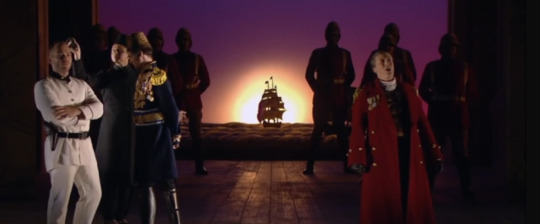

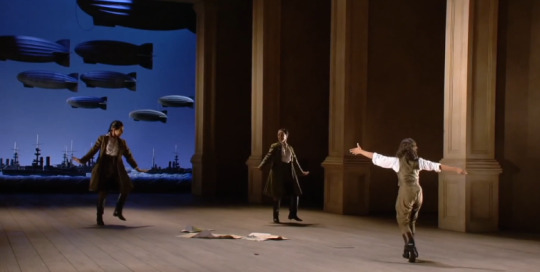
Mozart, Don Giovanni (1787), Festival Aix-en-Provence 2017
The opera: The bad man gets punished. It's Don Juan.
The video: A minimalist, "Brechtian" production. The acting is excellent, the costumes and gestures are very effective, everyone involved is super hot. The camerawork is the best I've seen.
Notable singers: Nahuel di Pierro, Isabel Leonard
Official link: medici.tv, it used to be on Youtube but alas.
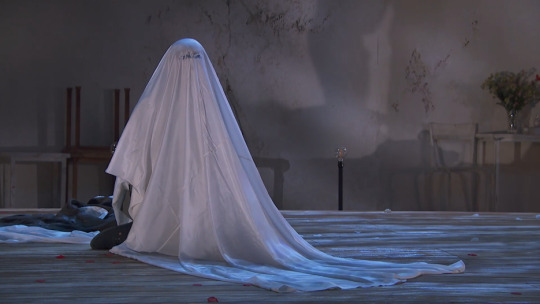
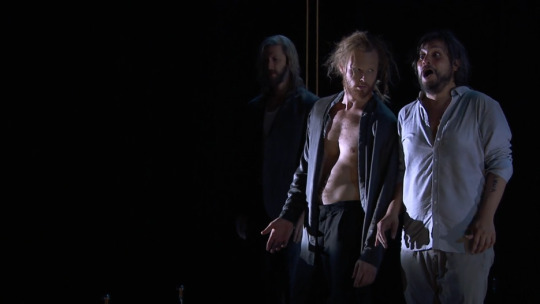
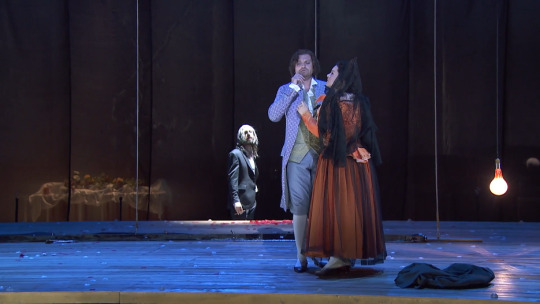
Rossini, Le Comte Ory (1828), Metropolitan Opera 2011
The opera: It's a fun farce about a youth who tries to seduce a countess and ends up in a threesome. Peak Rossini.
The video: A very Disney-esque production with simple sets and fairytale costumes, excellent acting, wonderful all around.
Notable singers: Juan Diego Florez, Diana Damrau, Michele Pertusi, Stephane Degout, Joyce DiDonato (yes, all of them)
Official link: Met Opera on Demand
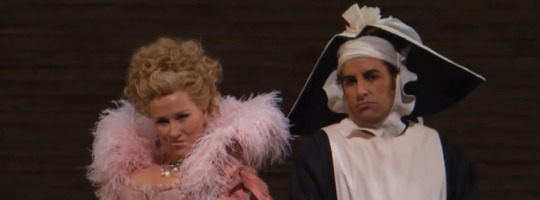
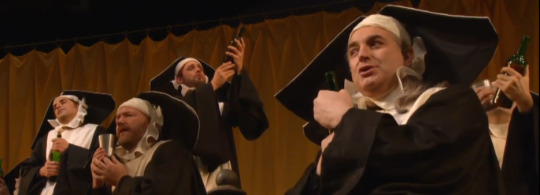
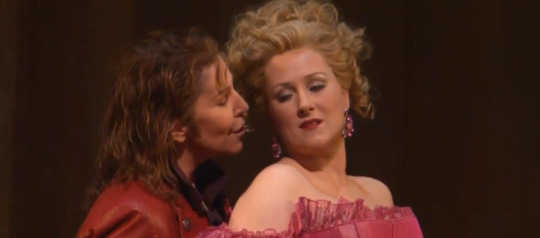
Gounod, Faust (1859), Metropolitan Opera 2011
The opera: A very simplified version of Goethe's tragedy Faust, a scholar makes a deal with the devil, seduces a girl, then regrets it.
The video: Instead of a 16th century devil, the seducer here is 20th century science. Basically Faust is a scientist who works for the military, his work haunts him and kills everyone he loves. The video itself is serviceable, I just really like the concept.
Notable singers: Jonas Kaufmann, Rene Pape
Official link: Met Opera on Demand

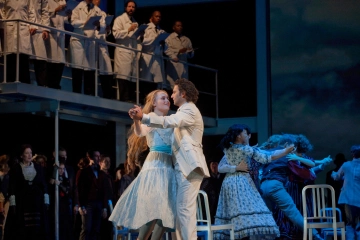
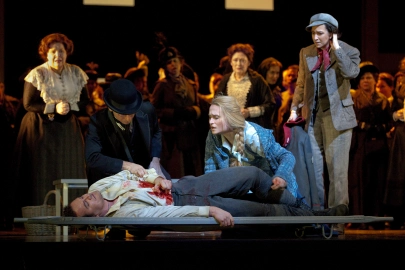
Verdi, Don Carlos (1867), Paris 1996
The opera: Based on Schiller's tragedy Don Carlos, it's about a crown prince who is very bad at his job and in love triangles with literally every other character. Heart-rendingly sad. I love it.
The video: This is pure eye candy, everything is unbelievably aesthetic and well shot, the gestures are fantastic, there's a lot of stage blood at one point. Mildly 90s camp but in a good way.
Notable singers: Thomas Hampson, Roberto Alagna, Waltraud Meier
Official link: medici.tv
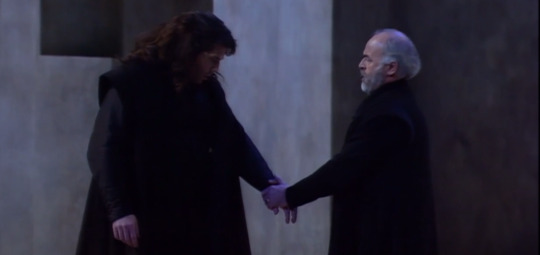


* Mostly based on whether I think the opera and production and video (and audio) are good. Very much my personal taste; I'm not an expert. I'm linking to official (paid) ways to watch them, all of them can also be found on the internet in various places, but the subtitle situation might be dire. Enjoy responsibly.
#giulio cesare#don giovanni#dg aix 2017#le comte ory#gounod faust#verdi don c#recommending things#because people asked
18 notes
·
View notes
Photo

Merry Christmas @kaufmann-6
Title: The Night We Met
Summary: Thomas didn’t save Newt and has to live with that…
Message to giftee: hello :) Merry Christmas, I hope you will like these moodboards!
Gift 2/2
54 notes
·
View notes